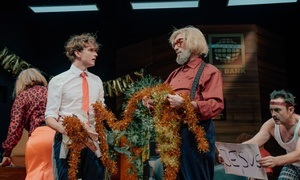In the organizer's words:
from Moliére
Tartuffe! Would you trust this man?
Wouldn't it be a longed-for relief for all of us if we met someone we could trust completely? - Someone who can guide us in all our decisions and attitudes in a demanding world? Orgon met him. Since then, Tartuffe has been his moral guiding star - Tartuffe, the wise one. Tartuffe, the empathetic one. Tartuffe, the philanthropist. Tartuffe, the pillar and foundation of society. Tartuffe, the guru.
Tartuffe also guarantees order in the family for Orgon's mother. For Orgon, however, this is still not enough. He would rather kill his wife and children than let them live in a world that is not imbued with Tartuffe's profound insights and plans to force his daughter to give up her first relationship in favor of Tartuffe.
How this moral bondage could come about is incomprehensible to the rest of the world. Is Tartuffe not a manipulator who takes his friend morally hostage and turns him into a fundamentalist?
In TARTUFFE, Molière shines a spotlight on the mechanisms of psycho-social seduction. Thanks to its timeless topicality, he created one of his most famous comedies. Its title character has been an integral part of the collective consciousness since its premiere in 1664. However, the premiere of Molière's own company of actors in front of Louis XIV in Versailles provoked censorship and the poet was only able to publish the play after some clever revisions.
For contemporaries, the portrayal of a person who exploits human weaknesses and social grievances for his own interests was a sharp, critical reflection of the existing order. In our time, the basis and mode of action of today's dogmas and fundamentalisms can be recognized.
A co-production with the Reichenau Festival
This content has been machine translated.









